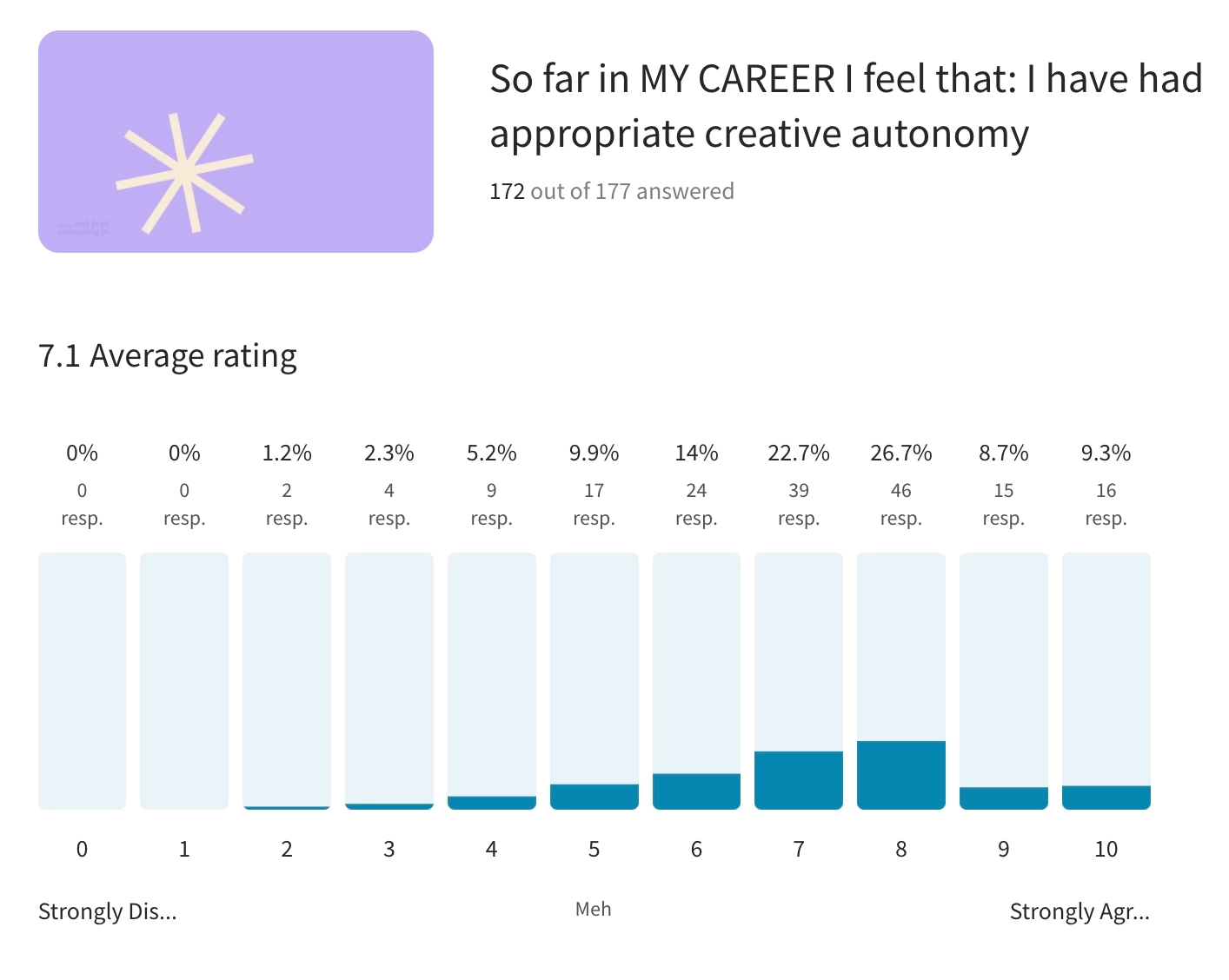NJCI Insights | The fight for creative autonomy

TL:DR The NJCI survey revealed that creative professionals generally feel a strong level of autonomy in their work with variations across company types, sizes, roles, and seniority, highlighting the importance of creative freedom for motivation and satisfaction.""

The second question in the NJCI survey centred around the level of creative freedom respondents felt. We asked, ‘so far in my career I feel that: I have had appropriate creative autonomy’ and we were pleased to see a generally positive response. The answers averaged out at 7.1 out of 10, which is the second highest score the survey results produced. In this blog, we’ll take a look into how this relates to wider research on autonomy and how responses differed between creative roles within the licensing industry, finishing with our recommendations to ensure you’re not just colouring in 😉
What exactly is creative autonomy?
Before we continue, let’s just clarify what we mean by creative autonomy. Creative autonomy is the freedom to decide what to work on and how to complete that work. It’s separate from flexibility which is freedom to choose where to work from and what hours to work. Both provide benefits to employees and employers but there is a distinct differentiation between the two.
Wider research on autonomy
How do our findings relate to wider research on professional creatives and the psychological effect of autonomy? It’s a particularly pertinent question, as research has shown that creative autonomy is a key motivation to stay with an employer, even more than salary.
‘We found that creative autonomy (43 percent) and salary (41 percent) were key motivations to stay with an employer. With clear career progression (25 percent) and good benefits (20 percent) cited by fewer people.’ ""
See the ‘If You Could’ report from It’s Nice That for more details.
This is also consistent with Self-Determination Theory, where autonomy is one of the three basic psychological needs (alongside competence and relatedness). Research based on this theory suggests that when autonomy is supported, individuals experience greater motivation, higher satisfaction, better performance, and improved wellbeing. Happy days!
Creative autonomy in the licensing and brand extension industry
Although the general response was pretty positive there were variances within respondent profiles.
Company type: Those working at agents have the healthiest sense of autonomy. Those working at licensees, meanwhile, are the least likely to feel a strong sense of autonomy.
Company size: Those working at small companies (0-10 employees) are most likely to feel a strong sense of autonomy. People at medium-sized companies (101-250 employees) are more likely than others to feel a low sense of autonomy.
Seniority: Founders and CEOs gave the highest autonomy scores. Seniors were more likely than other levels to feel low autonomy.
Role: Project Management roles reported the highest creative autonomy. Designers reported the lowest.
Now some of these results may seem pretty self-explanatory however let’s take a look at what might explain these differences.
Licensees often have to stick strictly to designs set by licensors; this may explain why they report a lower sense of autonomy than other company types.
Small companies have fewer layers of management and less formalised roles. Medium-sized companies, meanwhile, might reduce autonomy as roles and processes become more standardised.
Project managers, who typically oversee projects from start to finish, have the freedom to make a variety of decisions affecting outcomes. Designers, on the other hand, might find their autonomy limited by client specifications, budget constraints, and organisational policies.
Overall the creatives working in the licensing and brand extension industry report a solid level of autonomy which is fantastic but there are always outliers or room for improvement. In the spirit of this here are our recommendations:
Creative leads:
You are not just colouring in if … you are developing efficiencies that would allow your team time to do research, become inspired and bring new ideas to the table. If you’re constantly shutting people down, you’re the problem.
Creative professionals:
You are not just colouring in if … you are fighting to get something through that you believe in creatively. If you’re constantly being shut down, it’s time to start getting that C.V. out.
Want to be part of NJCI?
NJCI is about flipping the script for creatives in the licensing and brand extension industry. You’ve told us you want to shift the perception of creative departments from being seen as a cost to control, to being recognised and celebrated as profit centres. The 2024 NJCI report is the first step in that mission.
Understanding and valuing the contributions of creatives in brand licensing is crucial for fostering innovation and driving success in our industry. We want to empower creative teams to be able to advocate for a seat at the table and become more involved in the direction of the industry.
Join NJCI by signing up here and receive the report today. It’s packed full of insights from creatives working in licensing and Skew’s recommendations for the future.





